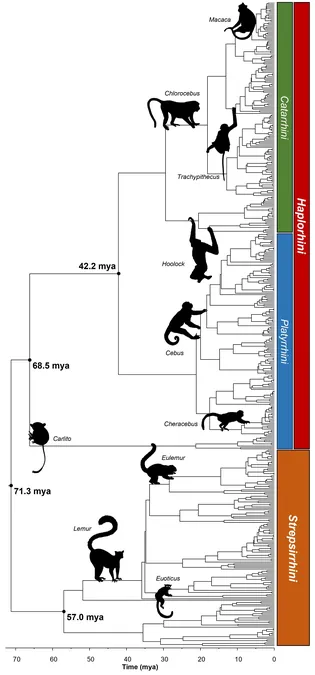
Unlocking the Secrets of Primate Evolution: The Most Comprehensive Timetree Revealed!
2024-12-16
Author: Mei
In a groundbreaking study published in Frontiers in Bioinformatics, a team of biologists from Temple University—Dr. Jack M Craig, Dr. Blair Hedges, and Dr. Sudhir Kumar—has successfully crafted a detailed evolutionary tree that captures the evolutionary narrative of 455 primates, representing every species for which genetic data is accessible.
This new primate timetree stands out as the most complete representation of its kind, intricately illustrating the evolutionary timeline for primates, including monkeys, apes, lemurs, lorises, and galagos.
The Importance of Timetrees: Understanding Our Place in Nature
Dr. Craig elaborates on this monumental work, highlighting that the Primates order comprises not only the seven great apes, which are closely related to humans, but also over 450 diverse species.
From the imposing 400-pound gorilla to the minuscule one-ounce mouse lemur, primates exhibit astonishing variability and behavior.
For instance, chimpanzees skillfully 'fish' for termites using customized sticks, while orangutans ingeniously use leaves as gloves to handle spiky durian fruits.
Despite being extensively studied, a comprehensive molecular phylogenetic hypothesis that encapsulates the entire primate evolutionary history has been lacking—until now.
The existing largest timed molecular phylogenetic tree includes only about 200 primate species, leaving a significant portion of primate evolutionary history unexplored.
Why Do We Need Complete Evolutionary Trees?
Complete evolutionary trees provide a critical framework for numerous scientific endeavors.
They serve as foundational tools for taxonomic efforts, aid in evaluating the rate of evolution, and facilitate research in fields such as biogeography and phylogeography.
Moreover, in an era where biodiversity is rapidly declining due to extinction events, these timetrees become vital in prioritizing conservation efforts and assessing the impacts of conservation strategies.
The Rarity of Comprehensive Phylogenies
It may come as a surprise that fully formed molecular phylogenies are quite rare.
While the NCBI taxonomy has molecular sequences for nearly 500,000 species, the TimeTree database—the major repository of timed phylogenies—holds just about 150,000 species.
An analysis revealed that most existing phylogenies mainly consist of small trees average roughly 25 species, necessitating coordinated efforts to compile a more extensive tree of life.
A Bright Future for Phylogenetic Research
The authors of the study discovered that while comprehensive, timed trees are rare, there are abundant untimed trees available in the literature, which can be transformed into valuable components of an overarching timetree.
By utilizing molecular data from repositories like NCBI GenBank and employing a supertree approach that integrates published data, the research team built a new synthetic supertree incorporating 455 primates.
Remarkably, this represents 98% of the primate species cataloged in the NCBI taxonomy and surpasses previous databases.
Completing the Picture of Primate Evolution
This meticulous effort not only fills in gaps in our understanding of primate evolution but also serves as an invaluable research protocol for exploring evolutionary relationships.
The newfound ability to analyze speciation rates across various primate clades reveals that age, rather than unique speciation rates, correlates more closely with species richness in major primate groups.
This remarkable study not only enhances our understanding of primate evolution but also paves the way for further research aimed at preserving the diversity of life on Earth.
As researchers continue to uncover the intricacies of our evolutionary history, this comprehensive timetree stands as a testament to our ongoing quest for knowledge about the natural world and our place within it.
Stay tuned for more thrilling revelations about the wonders of evolution and biodiversity! 🌍🔍 #PrimateEvolution #Biodiversity #ScienceNews


 Brasil (PT)
Brasil (PT)
 Canada (EN)
Canada (EN)
 Chile (ES)
Chile (ES)
 España (ES)
España (ES)
 France (FR)
France (FR)
 Hong Kong (EN)
Hong Kong (EN)
 Italia (IT)
Italia (IT)
 日本 (JA)
日本 (JA)
 Magyarország (HU)
Magyarország (HU)
 Norge (NO)
Norge (NO)
 Polska (PL)
Polska (PL)
 Schweiz (DE)
Schweiz (DE)
 Singapore (EN)
Singapore (EN)
 Sverige (SV)
Sverige (SV)
 Suomi (FI)
Suomi (FI)
 Türkiye (TR)
Türkiye (TR)